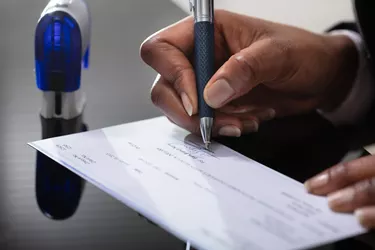
Whether you are dealing with a stolen checkbook or have had a check stolen that someone else wrote to you, take steps to ensure that you get reimbursement for any funds fraudulently taken.
The process for handling someone else cashing a check that wasn't theirs will depend on whether you're the account holder writing the check or the payee receiving it. If you wrote the check, contact your bank and the police regarding identity theft. If someone made a check payable to you, but someone else cashed it, you'll need to reach out to the check's issuer and hopefully get the check reissued after an investigation.
Video of the Day
Video of the Day
Contact Your Bank About Fraud
If your order of personal checks was lost in the mail and stolen, or an unauthorized party cashed a check you wrote, these are cases of stolen check fraud. Call your financial institution and speak with the department that handles fraud and theft to get an investigation started and help you get the money back.
When speaking with the bank's fraud department, let them know the check numbers of the checks you didn't write or authorize. Stop payment on any remaining unprocessed checks as damage control. Review your credit report and continue to monitor it closely for further signs of theft or fraud.
For security, consider closing the compromised account and setting up a new account. Remember that you'll need to update any parties that use your bank account to take payments or deposit funds.
Contact the local police department since check fraud is a form of identity theft. Your bank or check issuer might even require police involvement as part of the fraud investigation.
When talking to the police, be prepared with your latest bank statements showing the fraudulent checks coming out of your account or proof that a check was mailed to you. Ask for a copy of the police report in case your bank or check issuer needs you to present it.
State laws generally do not hold the account holder responsible for unauthorized transactions, paper or electronic. Depending on the amount of the loss, in addition to speaking with the police, you may want to seek legal advice to ensure you know all of your options, rights and next steps.
Call your financial institution and speak with the department that handles fraud and theft to get an investigation started and help you get the money back.
Report Check Fraud to the Issuer
If someone cashed a stolen check written to you, you'll need to reach out directly to the check's issuer alongside contacting the police.
For example, you'd contact the Internal Revenue Service (IRS) to file an identity theft affidavit for a stolen government check. The IRS would investigate and reissue the check if they can verify fraud took place.
In the case of a stolen paycheck, you could contact your employer and find out what policies they have; the bank, rather than your employer, may handle the situation.
Avoiding Check Theft and Scams
If you are paid by paper checks, it pays to take preventative measures since this type of payment can get lost or be subject to mail theft.
If your employer offers direct deposit, go for it. The Consumer Financial Protection Bureau (CFPB) notes that direct deposit is faster and more secure. It reduces the availability of your funds to check theft and scams.
Use your bank's mobile app and set up transaction alerts to keep a watchful eye on any funds going out. The sooner you know, the sooner you can contact your financial institution and stop payment on any fraudulent checks.
Know what check cashing scams are out there. The Federal Trade Commission (FTC) website can help you learn how scammers are targeting paper checks and what to do if you are victimized.
Steer Clear of Check Cashing Issues
If you need to order paper checks, check with your bank first. Your checking account may come with an allowance of free checks. Ordering through your financial institution and picking them up in person avoids potential mail interference, bank fraud and identity theft.
Consider using a money order when you need to turn over a paper check to someone you don't know. A money order lets you turn over the exact amount owed without having to share personal details like your home address, phone number and bank account number.
If you accept checks regularly, know how to spot check fraud. To avoid taking a bad check from someone, consider asking for a cashier's check. A genuine cashier's check is guaranteed by the financial institution that issued it, providing assurance that the funds are there to back it up.
If it works for your personal finances, use a credit card for outgoing payments. According to the Federal Deposit Insurance Corporation (FDIC), federal law caps unauthorized transaction liability at $50 for credit cards.
If a check is stolen from you or your bank account is compromised in any way, act quickly and seek expert help.
- LifeLock: Reporting Identity Theft to Police: Steps to Take and Things to Know
- Credit.com: Someone Stole My Tax Refund. Will I Ever Get it Back?
- Experian: What Is Check Fraud?
- HelpWithMyBank.gov: I Just Received My Account Statement and Noticed There Were Forged Checks. When I Notified the Bank, It Claimed the Forgeries Were Due to My Negligence. What Can I Do?
- Investor Mint: What Should You Do When You Lose Your Checkbook?
- Greenwald-Doherty: Employers’ Responsibility for Lost or Stolen Paychecks.
- White Rose Credit Union: Enroll in Direct Deposit for These 7 Incredible Benefits
- Consumer Financial Protection Bureau: Should I enroll in direct deposit?
- Federal Trade Commission: How to Spot, Avoid, and Report Fake Check Scams
- Federal Deposit Insurance Corporation: Welcome to the FDIC Knowledge Center